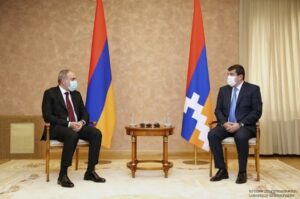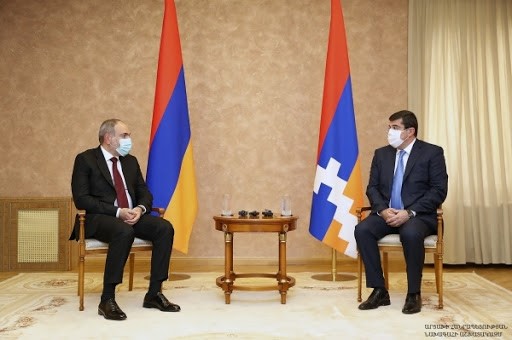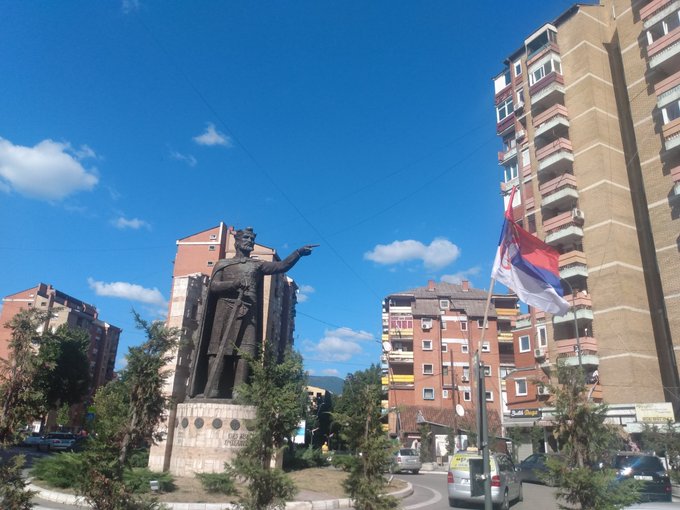Will Armenia Recognize the Independence of Nagorno-Karabakh?
Nagorno-Karabakh Republic (NKR) has not been recognized by any UN member state, including Armenia. There have been some rumors about Uruguay’s willingness to recognize NKR’s independence as well as Tuvalu’s intentions to establish diplomatic relations. So far, however, none of these have materialized. NKR has been recognized by Abkhazia, South Ossetia and Transnistria, but these recognitions do not bare any international legal consequence as far as these entities themselves remain outside of international society. The same is true with such subnational entities as Rhode Island, Massachusetts, Louisiana, Maine, California, Georgia, Hawaii, Michigan, Colorado, Minnesota in the U.S.; New South Wales in Australia; and Basque Country in Spain, which all have adopted a motion supporting NKR’s right to self-determination in one way or the other.
For some time now, NKR’s patron state, Armenia, has left the recognition issue as a last resort. Allegedly, if Azerbaijan resorted to military aggression, Armenia would have no other choice but to de jure recognize the NKR. This was first tested in April 2016, when Azerbaijan launched a limited military operation against NKR, but the Armenian side refrained from any actions that would lead to de jure recognition of NKR. In light of now a much larger scale military operation launched by Azerbaijan on September 27, 2020, Armenia is put to the second test with regards to NKR’s recognition. The Armenian Prime Minister, Nikol Pashinyan, has recently raised two points. First, that Armenia is considering to recognize the independence of Nagorno-Karabakh; and second, that they are also considering the possibility of forming a military-political alliance with NKR.

On 29 August 2020, NKR President Arayik Harutyunyan met in Stepanakert Prime Minister of the Republic of Armenia, Nikol Pashinyan (Source: The Government of Artsakh Republic).
It appears that Pashinyan sees such a move as establishing lasting stability in Nagorno Karabakh. The MFA of NKR has bolstered the same reasoning with the following words: “the international recognition of the Republic of Artsakh will become international community’s collective contribution to the restoration of regional peace and security and create conditions for resolving all remaining issues through negotiations”. One may still wonder how the legal recognition of NKR can contribute to peace-building and status negotiations? We have always been thinking that it takes two to tango, and that unilateral steps may cause unexpected consequences.
Despite these utterances, we believe that Armenia will actually try to avoid recognizing NKR at all costs. First of all, recognizing NKR goes against Armenia’s evolving discourse according to which one should blame Turkey for supporting international terrorism carried out by Azerbaijani militants. Anything that may divert from commonly acknowledged “disputed territories”, do not support Armenians in their “fight for global security”. On the contrary, Armenia’s recognition can be followed by the people’s will to join NKR with the rest of Armenia. In that case, secessionist warfare of Karabakhi Armenians for the sake of survival and self-determination will be translated into Armenia’s aggression against Azerbaijan. In other words, Azerbaijan’s discourse of “territories under occupation” may be endorsed and adopted by the wider international community, save for a few regional actors. All the countries that have supported Azerbaijan’s territorial integrity may isolate Armenia with the imposition of sanctions. This shift neglects the impossibility of co-existence of Armenians and Azeris in one country and points the finger towards Armenians who would have shaken the very peace and stability they claim to protect.
Secondly, Armenia has agreed to refrain from unilateral actions with regard to “disputed territories”, because it wants to preserve a seat at the negotiations table under the OSCE’s Minsk Group. The fact that Armenia behaves as a patron state for Karabakhi Armenians, with all implications this has had during various settlement talks, has been tolerated as long as Armenia’s patronage and sponsorship of the de facto independent NKR does not bring along status change in their bilateral relations (i.e., recognition of independence/unification). The formal status outcome has been subject to future, or rather postponed definition, within the scope of negotiations.
Thirdly, Armenia’s de jure recognition of NKR would not serve anything more than symbolism. Recognition would neither change the form of Armenia’s support for NKR nor open up any new avenues which the NKR does not already enjoy in its relations with Armenia. Symbolism may be important; i.e. it could play into identity politics by boosting the NKR Armenians’ enthusiasm and morale during current existential difficulties they are facing in their war with Azerbaijan. However, it seems unlikely that symbolism will prevail to the detriment of Armenia’s existing ties with the international community – especially with those directly engaged in the status talks, namely the U.S., Russia, and France. If counties other than Armenia, like Uruguay or Tuvalu, and let alone any regional power around the Caucasus, would take the recognition step first, would obviously be different. But this too appears unlikely.
Most importantly, Karabakhi Armenians have been undecided on the question of recognition themselves. This is largely because their immediate security matters more than the international legal standing of their self-proclaimed statehood. Albania’s recognition of Kosovo’s declaration of independence in 1992 changed little, if anything, on the grounds of Kosovo Albanians during the 1990s. Similarly, Russia’s recognition of Abkhazia and South Ossetia, in spite of inciting some academic curiosity on state recognition, had very little impact on the actual substance of Russia’s relations with Georgia’s two breakaway regions. It remains yet to be seen on what Armenia will prioritize during this crisis, for any move with de jure recognition of NKR will be a reflection on how Armenia, and not NKR, will deal with the consequences.
Authors: Eiki Berg and Shpend Kursani






